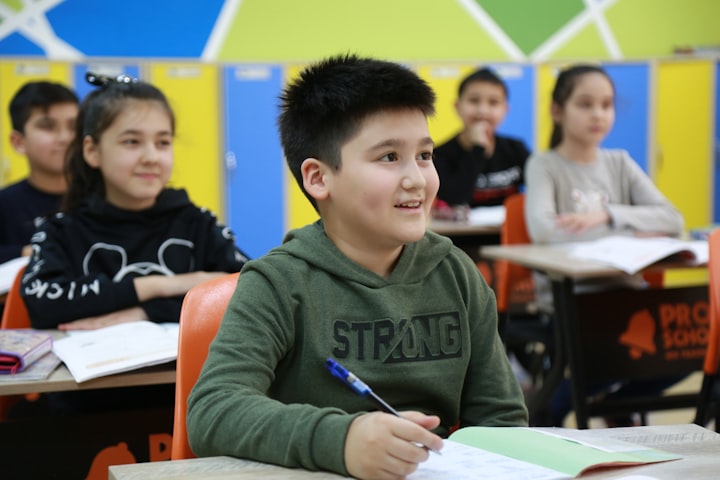Is It Ever Too Early for Young Students to Learn Medical Terms?
Experts say it's never to early

Kids are smarter than a lot of people give them credit for. They pick up on subtle cues and are constantly learning from the world around them. And yet, we often don’t teach them crucial information until they’re older—or not at all.
Why is this? Is it ever too early for kids to learn about important topics like health literacy and medical terms? They might not understand everything they hear, but it can’t hurt to introduce them to key topics that will benefit them for the rest of their lives.
The Benefits of Improving Health Literacy in the Public
The healthcare industry is complex and often difficult to understand. What’s worse is that many people lack basic health literacy in the United States. About 90 million people struggle to understand health information, which can have a huge impact on their well-being and quality of life.
If a person can’t understand the information provided by their doctor or health insurance company, they may have trouble following instructions that could benefit their health. They might also have problems implementing public health information during outbreaks like the COVID-19 pandemic, putting themselves and others at risk.
By improving health literacy among the general public, it will reduce the need for emergency services by increasing preventative care and giving people the tools they need to lead healthier lives overall. It could have an especially positive impact on low-income communities by promoting health equality.
Improving Health Literacy for Children

Learning starts from birth and even young children can learn important lessons about health. Kids who learn the importance of sleep, exercise, and nutritious foods will carry those lessons over into adulthood and may lead healthier lives as a result.
It’s very important for kids to learn the basics of healthy living at home, of course, but health literacy education can’t rest on parents alone. After all, many parents don’t have enough health literacy themselves and can’t teach their children key concepts and terms they will need to navigate the healthcare system.
Many initiatives have been proposed for increasing health literacy in the United States, but the literacy rate continues to remain low. So how can we improve health literacy for children and get them on track to living healthy, happy lives?
Bringing health into the classroom is one way to help ensure kids have the tools they need to stay healthy throughout their lives and understand complex health information. However, no mandate exists for bringing health education into the classroom. So, despite the fact that there is a strong framework available for health literacy in schools readily available, many schools are implementing no health education at all, or very little.
Healthy Eating, Mental Health Awareness, and Sexual Education in Schools

So many topics are involved in health literacy. Obviously, kids need to have strong reading and comprehension skills to prepare them for obtaining and understanding health information provided by healthcare professionals and public agencies. But simply being able to read isn’t enough.
Knowing medical terms is an important aspect of health literacy that can start right away. Parents and educators can teach children proper terminology to describe different parts of the body and how to describe any symptoms they have. Kids are sponges so there’s no reason they can’t learn terms like “abdomen” from a very early age!
Mental health awareness is also very important. While we usually don’t think about children’s mental health as much as adults’, teaching kids how to discuss these topics appropriately and emphasizing the importance of mental health is crucial. Kids can get anxious or depressed too and it’s important for them to be able to take care of themselves properly and to seek help when necessary.
Sexual health is another important topic for kids as they start to grow up. While formal health and sexual education might not start until kids are older, it’s important to avoid kids getting conflicting information and to talk about sex in a healthy way.
Health literacy also includes knowing the basics of nutrition and healthy eating and the importance of exercise, sleep, and hydration. These basic health building blocks should be taught to kids early in their lives so they form good habits and know how to care for themselves to prevent illness and poor health. Educators can help by introducing these topics through many different classroom activities.
Healthcare Management Understanding and Resources for Students
Thanks to technology and education, medicine is becoming more personalized and collaborative to better serve patients. With that shift, health literacy is becoming increasingly important. From an early age, students should be provided with opportunities to learn and develop their health literacy skills and knowledge of human anatomy and health.
Older students, who might be in the position of choosing a health plan in the near future, should make an effort to learn key healthcare terms so they can understand what their options are when it’s time to get their own insurance. Bringing these discussions into high school health curriculums could greatly improve students’ ability to comprehend health information in the future.
Another benefit of teaching kids about health from a young age is that it could pique their interest in working within the field of health and medicine. As the population ages and places a greater burden on the healthcare system, we will need healthcare workers, caregivers, and health experts to serve our communities.
Get Started Now!
The good news is that even though many schools aren’t implementing health literacy curriculums or teaching medical terminology, families and individual educators can still make a difference in kids’ lives. Families can start using these terms at home and discuss why health is so important for a good life.
Educators can get creative and find ways to implement mindfulness and health topics into their lessons, regardless of the subject they teach. It can also be helpful to discuss health literacy with school administrators to push for a more formal health literacy program in the classroom.
Preparing kids for adulthood can be a challenging process. But if we don’t start kids on the right path for a healthy life, we’re letting them down. Get started now with small steps!






Comments
There are no comments for this story
Be the first to respond and start the conversation.